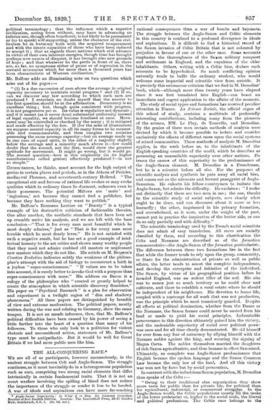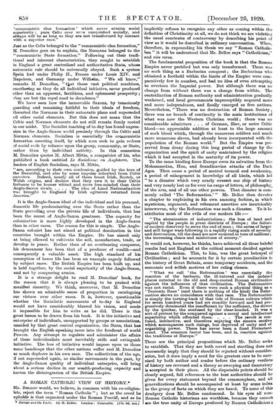THE ALL-CONQUERING RACE.•
WE are all of us participants, however unconsciously, in the ancient struggle between Celt and Anglo-Saxon. The struggle continues, as it must inevitably do in a heterogeneous population such as ours, comprising two strong racial elements that differ intrinsically in certain fundamental traits. That it is not an overt warfare involving tho spilling of blood does not reduce the importance of the struggle or render it loss to be heeded. A war of ideals and aspirations can have more far-reaching • Anglo-Saxon Superiority : to What it i.e Due. Ey Edmond Demolins. Reprint of first English Edition. London: The Leadcnhali Tress, 29-47 Garden Bow. Southwark. S.E. I. [2.5. 6d. net.] national consequences than a war of bombs and bayonets. The struggle between the Anglo-Saxon and Celtic, elements in this country is confined to a profound divergence in ideals and aspirations. It is difficult to find a historical record of
the Saxon invasion of Celtic Britain that is not coloured by prejudice in favour of one or the other race. Some accounts emphasize the thoroughness of the Saxon military conquest and settlement in England, and the expulsion of the older inhabitants. Others, writing with a Celtic bias, declare such accounts to be hyperbolical. So much conflicting opinion naturally tends to baffle tho ordinary student, who would welcome some impartial and scientific view from outside. It is precisely this extraneous criticism that we find in M. Demolins' book, which—although more than twenty years have elapsed since it was first translated into English—can boast an
immediate and cogent application to the affairs of the moment. The study of social types and formations has received peculiar attention in France. La &knee Sociak, the official organ of
this school of study, contains a multitude of profoundly interesting contributions, including many from the pioneers of the science, MM. Le Play, do Tourvillo, and Demolins. By the genius of these mon certain methods of analysis were devised by which it became possible to isolate and consider exclusively the effects of different races upon the social systems of mixed communities. These methods of analysis M. Demolins applies, in the work before us, to the inhabitants of the English-speaking countries of the world, which he describes as possessing an unassailable superiority over other nations. He traces the causes of this superiority to the predominance of the Anglo-Saxon element. M. Domolins is a Frenchman, but ho is a scientist before all else. For tho purposes of scientific analysis and synthesis he puts away all racial bias, and comes out as tho advocate and fervent panegyrist of Anglo- Saxonism. Ho exhorts his fellow-countrymen to imitate the Anglo-Saxon, but admits the difficulty. He exclaims : " I make out distinctly that there aro two men in me ; the one, thanks to the scientific study of social subjects, sees clearly what ought to be done, and can discourse about it more or less learnedly ; the other, imprisoned in his primary formation, and overwhelmed, as it wore, under the weight of the past, cannot put in practice the inspiration of the better side, or can do so only partially and with difficulty."
The scientific terminology used by the French social scientists does not admit of easy translation. All races are socially classified by them, and according to this classification the Celts and Normans are described as of the formation communautaire—the Anglo-Saxon of the formation particulariste.
The difference between these two formations lies in the fact that while the former tends to rely upon the group, community, or State for the administration of private as well as public affairs, the latter tends to assert the complete independence, and develop the enterprise and initiative of the individual.
The Saxon, by virtue of his geographical position before he invaded England, was an ardent tiller of the soil His aim was to annex just so much territory as he could clear and cultivate, and there to establish a rural estate whore ho should be independent of his neighbours. His devotion to home life, coupled with a contempt for all work that was not productive, was the principle which he most tenaciously guarded. Despite all efforts at political domination, whether from the Danes or the Normans, the Saxon farmer could never be ousted from his land or made to yield his social principles. Indomitable perseverance in this direction ultimately gained him the victory, and the undeniable superiority of social over political power was once and for all time clearly demonstrated. He iii himself for ever from any fear of autocracy by allying himself with the Norman nobles against the king, and securing the signing of Magna Carta. The nobles themselves married the daughters of rich Saxon agriculturists, and thus became in effect Saxonizod.
Ultimately, so complete was Anglo-Saxon predominance that English became the spoken language and the Saxon Common Law became the only law of the land. And all this victory was won not by force but by social permeation.
In contrast with the industrious Saxon population, M. Demolins thus speaks of the Celts :-
" Owing to their traditional clan organization they show more taste for public than for private life, for political than for agricultural, industrial, or commercial struggles. In the Anglo-Saxon world, the Celtic populations mostly fill the ranks of the lower proletariat or, higher in the social scale, the liberal and political professions. The Celtic race belongs to the
'communistic clan formation' whioh never attains social superiority ; pure Celts ever wrm vanquished socially, and always will be as long as they are not transformed by contact with a superior race."
Just as the Celts belonged to the " oommunistic elan formation," M. Bernell= goes on to explain, the Normans belonged to the "communistic State formation." Following out their tradi- tional and inherent characteristics, they sought to establish in England a great centralized and authoritative State, whose autocratic rule should be universally obeyed. Such a system Spain had under Philip IL, France under Louis XIV. and Napoleon, and Germany under Wilhelm. " We all know," remarks M. Demolins, " tbat those vast political machines, smothering as they do all individual initiative, never produced other than an apparent, factitious, and ephemeral prosperity ; they are but the royal road to decadence."
We have seen how the immovable Saxons, by tenaciously guarding and remaining faithful to their ideals of freedom, thwarted the Normans in their autocratic plane and superseded all other racial elements. But this does not mean that the Celtic and Norman elements do not still remain firmly rooted in our midst. The Socialist teaching of to-day has found expres- sion in the Anglo-Saxon world precisely through the Celtic and Norman elements. Socialism is essentially the communistic formation asserting itself, by which men seek to gain redress of social evils by reliance upon the group, community, or State, rather than by individual activity. In this connexion M. Demolins quotes M. Albert Merin, a compatriot of his, who published a book entitled Le Socialism; en Angleterre. The leaders of English Socialism, says M. Main, " are, according to their own confession, guided by the love of the Beautiful, and also by some impulse inherited from Celtic ancestors. Indeed, nearly all of them boast Irish, Scotch, or Welsh origins, and declare that they owe it to their Celtic forbears to be keener witted and more free-minded than their Anglo-Saxon rivals. . . . . The idea of Land Nationalization was brought to England by Irish agitators returned from America."
It is the Anglo-Saxon ideal of the individual and his personal, domestic life predominating over the State rather than the State prevailing over the private life of individuals, that has been the secret of Anglo-Saxon greatness. The capacity for colonization is more highly developed in the Anglo-Saxon than in other races. Tho reason for this is simple. The Anglo- Saxon colonist has not aimed at political domination in the countries brought within the Empire. He has aimed. only at being allowed to cultivate the soil, manufacture, trade, or develop in peace. Rather than of an overbearing conqueror, his demeanour has been that of a producer of wealth—and consequently a valuable asset. Tho high standard of his conception of home life has been an example eagerly followed by subject laces. The British Empire has been built up, and is held together, by the social superiority of the Anglo-Saxon, and not by conquering armies.
It is a strange delight to read M. Domolins' book, for the reason that it is always pleasing to be praised with manifest sincerity. We think, moreover, that M. Domolina has shown an admirable sense of proportion in cataloguing our virtues over other races. It is, however, questionable whether the Socialistic movements of to-day in England would not have considerably blurred his vision, and made it impossible for him to write as he did. There is this great lesson to be drawn from his book. It is the initiative and enterprise of individuals, unsupported by groups or associations, unaided by that great central organization, the State, that has brought the English-speaking races into the forefront of world Powers. Any attempt to regulate and administer the affairs of these individualists must inevitably stifle and extinguish Initiative. The loss of initiative would impose upon us those same handicaps that the other nations suffer and M. Demolins so much deplores in his own race. The collectivism of the age, if not superseded again, as similar movements in the past, by the Anglo-Saxon quality of individual enterprise, will bring shout a serious decline in our wealth-producing capacity and hasten the disintegration of the British Empire.



































 Previous page
Previous page